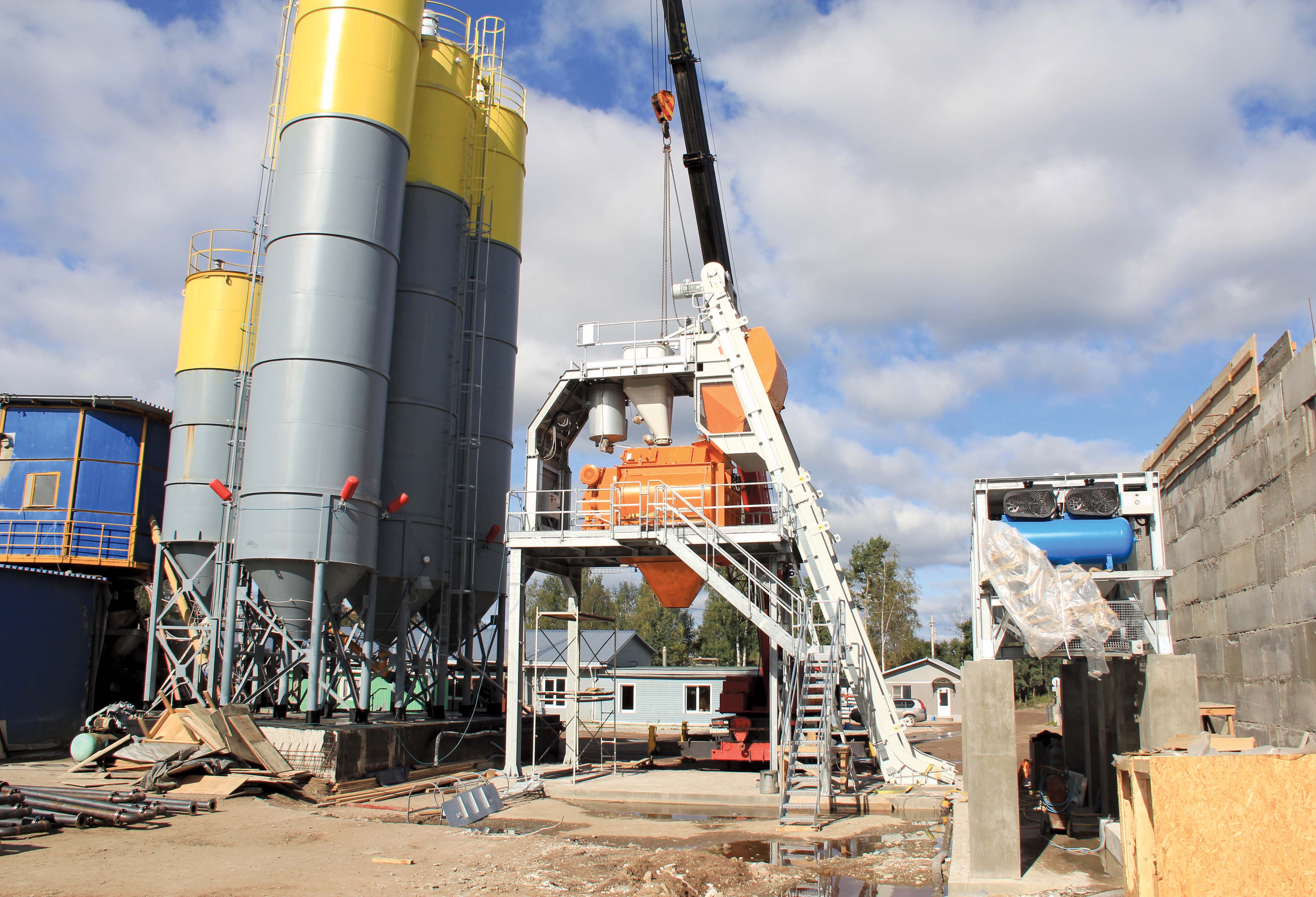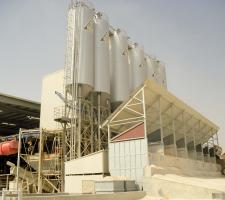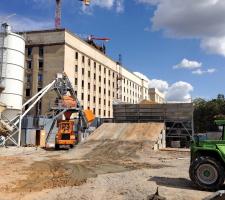
While one leading concrete production equipment manufacturer is investing heavily in cutting-edge technology, others are finding their new and existing batching plants in big demand. Guy Woodford reports.
Elkon is among the leading global concrete production equipment manufacturers with big plans for 2015. As part of the Turkish company’s continuous investment in its manufacturing facilities in order to improve product quality and production speed, the firm recently increased its number of welding robots to eight.
The multimillion euro welding robot investment will make for more efficient and flexible annual production of cement screws, twinshaft mixers, cement silos, and aggregate silos.
A company spokesperson said: “We are able to access better-quality, more accurate and faster production with our welding robots, which also give us flexibility with modular production and high-quality with mass production. These modern technologies guarantee precision in production, ensure the reliability of the equipment and improve productivity and reduce production errors.”
The Elkon spokesperson said that guests who had visited the company concluded that Elkon production facilities (65,000m² production area across four factories) are not only the biggest and most modern concrete batching plant manufacturing facilities in Turkey, but also Europe’s biggest and most modern concrete batching plant manufacturing facilities.
The Max Bögl Group of Companies has acquired a new
Hybrid towers for wind turbines produced by Max Bögl are up to 140m in height and comprise of 17 concrete rings and three steel segments. A particularly high strength of concrete is necessary and the mix formula must meet these exacting requirements accordingly. Complex mixing tests using an innovative formula were successfully conducted by Liebherr at their in-house technical test centre in Bad Schussenried at the end of 2013. The new Liebherr ring-pan mixer RIM 2.5-D proved to be the optimum equipment for mixing of these special concrete types.
Max Bögl opted for a Betomat V/875 type mixing tower. Up to 875m³ of aggregates can be loaded into eight chambers, ensuring, says Liebherr, a storage volume sufficient for two days of production. The entire mixing plant, including ring-pan mixer and weighing of gravel, cement, water and admixtures, is, according to Liebherr, designed around a redundancy concept. Both systems produce synchronously and discharge directly into the bucket transport system for subsequent conveyance into the production halls. Special design features include sample withdrawal points on the ring-pan mixers, a cleaning platform, optional alternative discharge of concrete into the truck mixers and a residual concrete recycling plant.
By using manufactured sand instead of river sand it eliminates the drying stage, drastically reducing both infrastructure and production costs. Zoomlion is very keen to emphasise the environmentally friendly green credentials of the product. “It represents the future of the industry,” said Su Zimeng, secretary-general of China Construction Machinery Association.
It is available as a tower, station or multistep structure. The two-in-one system overcomes the problems of conventional mixing such as the inability to recycle resources, lack of sand resources and severe pollution. Zoomlion claim the two-in-one solution can reduce commercial mixing costs by $6.19/tonne and dry mortar costs by $3.10/tonne.
The introduction comes at a time that Zoomlion has moved to broaden its field of operations to include areas such as environmental protection and heavy-duty trucks.
Zoomlion has also recently won an order for two 63metre concrete pump trucks from a large ready-mix concrete company based in Turkey.
Described by Austrian firm
In addition to producing high-quality ready-mixed concrete, high-end plants such as the EUROMIX 3300 are designed to cope with extreme weather conditions and offer flexibility and self-sufficient functionality.
EUROMIX 3300 can produce up to 145m³ of concrete/hour and is said to be able to optimally adapt to each set of deployment conditions.
The requirements for the Wind Park project in Flensburg included the installation of the EUROMIX 3300 mixing plant in a vacant field, no foundations, extremely mobile operation, mobile infrastructure for electricity and water, just-in-time supply with rocks and cement, minimum transport efforts on public roads, and after completion of the Wind Park project, the complete renaturation of the working area to grassland.
Further ITIRUS installations included a number of CIFAMOOVE batch plant models from CIFA’s mobile batching plant series; these included CIFAMOOVE 75 models for TransEvoTeh in Moscow and StroyTrans in Kirov, and a CIFAMOOVE 30 plant for BazisEnergo in Khanty-Mansiysk.
The CIFAMIX 120 with helicoidal twin shaft mixer is capable of producing up to 120m³ of concrete/hour. The CIFADRY 80, available with four, five or six aggregate bins, can produce up to 80m³ of concrete/hour. The CIFAMOOVE 30, equipped with a planetary mixer type, is capable of producing up to 30m³ of concrete/hour. The CIFAMOOVE 75, which is said by CIFA, along with the CIFAMOOVE 90, to be the best choice for easy installation, big aggregate storage and medium-high hourly concrete production, comes with a helicoidal twin shaft mixer type and can produce up to 75m³ of concrete/hour.
ITIRUS began its cooperation with CIFA in 2001. A spokesperson for the company, which has six offices throughout Russia, said: “The goal we are trying to reach is to be always next to our customers and to obtain their constant satisfaction.
“CIFA plants are distinguished by their high production capacity and maximum reliability; the result of careful design aimed at improving the dynamics of mixing with the use of the most appropriate materials and technical solutions.”
Salini Impreglio has been using two Simem Wetbeton 140 plants to produce 23,200m³ of cement/day for the Grand Ethiopian Renaissance Dam project. Situated on the Blue Nile River around 40km east of the Sudan border, the project involves the construction of a main dam in Roller Compacted Concrete (RCC), with two power stations installed at the foot of it. At 6,000MW, the Dam will be the largest hydroelectric power plant in Africa on its completion.
Simem’s involvement in the Dam project is said to have further enhanced its already impressive reputation for quality concrete batching plant supply to major global dam works.
In other news from the Italian firm, concrete batching plant specialists H S Services, who have been delivering plants to UK sites for over 25 years, have been officially appointed as Simem’s UK & Ireland dealers and installers.
Marcantonini, another Italian concrete batching plant manufacturer, has been busy over the last three years delivering concrete batching plants and concrete distribution systems to some of the main concrete production companies in Romania.
A new Marcantonini concrete batching plant for Bauelemente from Ploiesti’s precast elements factory consisted of six aggregate hoppers with 350m3 of capacity, two mobile hoppers for coloured quartz, one mobile scale hopper for aggregates, one twin shaft mixer 3000\2000 for wet and wet concrete production, an automatic moisture and plasticity control system, and two 120tonne cement silos. The plant was also completed insulated with sandwich panel.
Another Marcantonini plant for Victor Construct’s Botosani blocks and pipes factory comprised six aggregate hoppers offering 300m³ of capacity, two mobile hoppers for coloured quartz, one mobile scale hopper for aggregates, one planetary mixer 1500\1000 for grey concrete, one planetary mixer 565\375 for coloured concrete, an automatic moisture and plasticity control system, two 80tonne cement silos, two flying buckets for concrete transport, 180m of rails for flying buckets, and total sandwich panel insulation.
The most recent bespoke Marcantonini batching plant is now just starting to be used for girder production by Lupp Construct, from Sibiu. This plant’s elements include an automatic aggregates loading system, five aggregate hoppers with total capacity of 150m³, one twin shaft mixer 3000\2000 for wet and wet concrete production, three 80tonne and 60tonne cement silos, a containerised aggregates heating system, and a completely insulated sandwich panel plant structure.
Marcantonini says it designs its high quality output plants with an emphasis on functionality, practicality, ease of maintenance and reduction of environmental impact, the latter achieved by greatly decreasing water consumption through an innovative recycling system.
Technology on Marcantonini batching plants also, the firm says, ensures optimum control of consistency and quality concrete throughout the mixing phase for all kinds of prefabricated elements. Furthermore, typical of all Marcantonini equipment, the surfaces are specially designed to prevent all possibility of residue pile-up so as to minimise spillage as well as facilitate cleaning and maintenance.
In January 2015 US-based
CEI senior engineer Kevin Wentland describes the TSC plant as a “high volume continuous concrete mixing plant that can be utilised to produce cement-treated base, zero slump RCC and pervious low slump and high slump concrete materials, all from a single plant.”
Jim Johnson, regional sales manager for CEI, added: “The TSC plant is a design unique to the industry. It brings state-of-the-art mechanical tools necessary to produce concrete, of all types, with a consistency and a quality level far surpassing the traditional methods.”
Of the market reaction to the new CEI Enterprises concrete plant range, Johnson said: “We have seen a considerable amount of interest in the TSC plant, due to its versatility and its high-quality, high-precision, and high-volume production capabilities. We have also received substantial interest from ready-mix producers in our new TSB batch mixer, because it easily expands their production capabilities to include RCC.”
The TSB Mobile RCC Batch Mixer allows a traditional ready-mix batch plant to produce RCC by simply incorporating this new mixer into the existing plant’s workflow.
Wentland said: “The TSB provides existing ready-mix plants with a means to make RCC through the use of a portable twin shaft batch mixer placed under the existing concrete plant with a set-up time of less than 30 minutes. This flexibility of material supply greatly expands the capabilities for smaller projects using RCC. For example, busy intersections could be closed after Friday traffic rush and reopened on Monday morning prior to the start of the morning rush.”
















